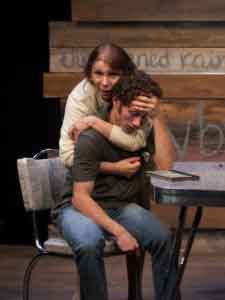
As we learn through the opening scene, this is a Jewish family who had many memories of the Holocaust and the Kristallnacht ( the night of the broken glass, when Nazis stormed through the business districts and smashed the windows of the shops owned by the Jewish merchants.- that was 1938, over 70 years ago. This torrid “love” story written by Ron Hirsen and directed with much heart and soul by Dennis Zacek ( who made Victory Gardens what it was over the years) is a bit short in story while getting to the strong points of the survivals, love and hopes of those who survived.

We do get to meet his father as well, Papa ( a sharp and definitive character played by Bernard Beck) and find that Helmut an dhis father were in the camp together- and that Helmut was the one to carry his dead father out to the piles of bodies that lined the trenches making room for the next batch. To carry this in ones memories for years and years has got to be the hardest of tasks in any man’s life. In this story we learn of the torment felt by the elder family memebrs who despite new lives live with the haunting memories and no matter how hard they try to forge a new life filled with hope and love, the memories live on forever. For the younger generation, the ones who did not know the pain and anguish their parents and grandparents endured, there is frustration in not being told the truth. Yet, telling the truth will open old woulnd for the parents.There is some wonderful musical interludes on Cello played by Bill Meyers. The set ( Grant Sabin) is very simple and functional, never detracting form the action of the actors. Claire Chrzan’s lighting sets the tone and the mood to perfection.
Again, this is a beautiful story about a family that has pain, but the pain can be eliminated when they face the conflicts between the generations and express their deep love within to each other. As I said earlier, I would love to see some further exploration and would not mind knowing even more about these characters. Perhaps, just maybe, The Elegy Project will take this story to the next level and fill in some of the gaps. You can judge for yourself at The Victory Gardens Biograph Theatre located at 2433 N. Lincoln Avenue where “Elegy” will continue through December 1st with performances as follows:
Thursdays and Fridays at 7:30 p.m.
Saturdays at 5 and 8:30 p.m.
Sundays at 3 p.m.
NO performance on Thanksgiving, but will be an extra on December 1st at 7 p.m.
Tickets are $42 ( open general seating) and can be purchased by calling 773-871-3000 or online at www.victorygardens.org or www.elegyproject.org
A portion of the ticket revenue goes to the Illinois Holocaust Museum and Education Center
To see what others are saying, visit www.theatreinchicago.com go to Review Round-up and click at “Elegy”

